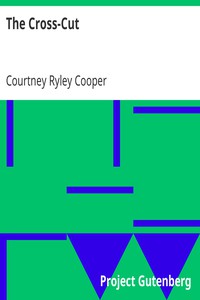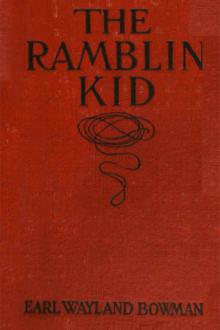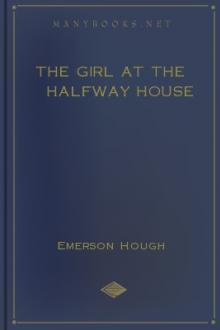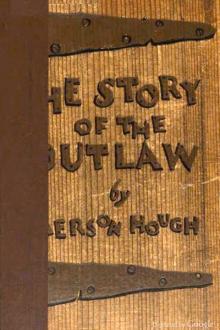The Cross-Cut, Courtney Ryley Cooper [best ereader for manga txt] 📗

- Author: Courtney Ryley Cooper
Book online «The Cross-Cut, Courtney Ryley Cooper [best ereader for manga txt] 📗». Author Courtney Ryley Cooper
"Which is quite plain," agreed Fairchild ruefully. Harry rubbed the libeled proboscis, pawed at his mustache and fidgeted in his chair.
"I understand that, all right," he announced at last. "But why should anybody want to buy the mine?"
It brought Fairchild to the realization of a new development, and he brought forth the letter, once more to stare at it.
"Fifty thousand dollars is a lot of money," came at last. "It would pretty near pay us for coming out here, Harry."
"That it would."
"And what then?" Mother Howard, still looking through uncolored glasses, took the letter and scanned it. "You two ain't quitters, are you?"
"'Oo, us?" Harry bristled.
"Yes, you. If you are, get yourselves a piece of paper and write to Denver and take the offer. If you ain't—keep on fighting."
"I believe you 're right, Mother Howard."
Fairchild had reached for the letter again and was staring at it as though for inspiration. "That amount of money seems to be a great deal. Still, if a person will offer that much for a mine when there 's nothing in sight to show its value, it ought to mean that there's something dark in the woodpile and that the thing 's worth fighting out. And personally speaking, I 'm willing to fight!"
"I never quit in my life!" Harry straightened in his chair and his mustache stuck forth pugnaciously. Mother Howard looked down at him, pressed her lips, then smiled.
"No," she announced, "except to run away like a whipped pup after you 'd gotten a poor lonely boarding-house keeper in love with you!"
"Mother 'Oward, I 'll—"
But the laughing, gray-haired woman had scrambled through the doorway and slammed the door behind her, only to open it a second later and poke her head within.
"Need n't think because you can hold up a dance hall and get away with it, you can use cave-man stuff on me!" she admonished. And in that one sentence was all the conversation necessary regarding the charges against Harry, as far as Mother Howard was concerned. She did n't believe them, and Harry's face showed that the world had become bright and serene again. He swung his great arms as though to loosen the big muscles of his shoulders. He pecked at his mustache. Then he turned to Fairchild.
"Well," he asked, "what do we do? Go up to the mine—just like nothing 'ad ever 'appened?"
"Exactly. Wait until I change my clothes. Then we 'll be ready to start. I 'm not even going to dignify this letter by replying to it. And for one principal reason—" he added—"that I think the Rodaines have something to do with it."
'"Ow so?"
"I don't know. It's only a conjecture; I guess the connection comes from the fact that Squint put a good valuation on the mine this morning in court. And if it is any of his doings—then the best thing in the world is to forget it. I 'll be ready in a moment."
An hour later they entered the mouth of the Blue Poppy tunnel, once more to start the engines and to resume the pumping, meanwhile struggling back and forth with timbers from the mountain side, as they began the task of rehabilitating the tunnel where it had caved in just beyond the shaft. It was the beginning of a long task; well enough they knew that far below there would be much more of this to do, many days of back-breaking labor in which they must be the main participants, before they ever could hope to begin their real efforts in search of ore.
And so, while the iron-colored water gushed from the pump tubes. Harry and Fairchild made their trips, scrambling ones as they went outward, struggling ones as they came back, dragging the "stulls" or heavy timbers which would form the main supports, the mill-stakes, or lighter props, the laggs and spreaders, all found in the broken, well-seasoned timber of the mountain side, all necessary for the work which was before them. The timbering of a mine is not an easy task. One by one the heavy props must be put into place, each to its station, every one in a position which will furnish the greatest resistance against the tremendous weight from above, the constant inclination of the earth to sink and fill the man-made excavations. For the earth is a jealous thing; its own caverns it makes and preserves judiciously. Those made by the hand of humanity call forth the resistance of gravity and of disintegration, and it takes measures of strength and power to combat them. That day, Harry and Fairchild worked with all their strength at the beginning of a stint that would last—they did not, could not know how long. And they worked together. Their plan of a day and night shift had been abandoned; the trouble engendered by their first attempt had been enough to shelve that sort of program.
Hour after hour they toiled, until the gray mists hung low over the mountain tops, until the shadows lengthened and twilight fell. The engines ceased their chugging, the coughing swirl of the dirty water as it came from the drift, far below, stopped. Slowly two weary men jogged down the rutty road to the narrow, winding highway which led through Kentucky Gulch and into town. But they were happy with a new realization: that they were actively at work, that something had been accomplished by their labors, and progress made in spite of the machinations of malignant men, in spite of the malicious influences of the past and of the present, and in spite of the powers of Nature.
It was a new, a grateful life to Fairchild. It gave him something else to think about than the ponderings upon the mysterious events which seemed to whirl, like a maelstrom, about him. And more, it gave him little time to think at all, for that night he did not lie awake to stare about him in the darkness. Muscles were aching in spite of their inherent strength. His head pounded from the pressure of intensified heart action. His eyes closed wearily, yet with a wholesome fatigue. Nor did he wake until Harry was pounding on the door in the dawn of the morning.
Their meal came before the dining room was regularly open. Mother Howard herself flipping the flapjacks and frying the eggs which formed their breakfast, meanwhile finding the time to pack their lunch buckets. Then out into the crisp air of morning they went, and back to their labors.
Once more the pumps; once more the struggle against the heavy timbers; once more the "clunk" of the axe as it bit deep into wood, or the pounding of hammers as great spikes were driven into place. Late that afternoon they turned to a new duty,—that of mucking away the dirt and rotted logs from a place that once had been impassable. The timbering of the broken-down portion of the tunnel just behind the shaft had been repaired, and Harry flipped the sweat away from his broad forehead with an action of relief.
"Not that it does us any particular good," he announced. "There ain't nothing back there that we can get at. But it's room we 'll need when we start working down below, and we might as well 'ave it fixed up—"
He ceased suddenly and ran to the pumps. A peculiar gurgling sound had come from the ends of the hose, and the flow depreciated greatly; instead of the steady gush of water, a slimy silt was coming out now, spraying and splattering about on the sides of the drainage ditch. Wildly Harry waved a monstrous paw.
"Shut 'em off!" he yelled to Fairchild in the dimness of the tunnel. "It's sucking the muck out of the sump!"
"Out of the what?" Fairchild had killed the engines and run forward to where Harry, one big hand behind the carbide flare, was peering down the shaft.
"The sump—it's a little 'ole at the bottom of the shaft to 'old any water that 'appens to seep in. That means the 'ole drift is unwatered."
"Then the pumping job 's over?"
"Yeh." Harry rose. "You stay 'ere and dismantle the pumps, so we can send 'em back. I 'll go to town. We 've got to buy some stuff."
Then he started off down the trail, while Fairchild went to his work. And he sang as he dragged at the heavy hose, pulling it out of the shaft and coiling it at the entrance to the tunnel, as he put skids under the engines, and moved them, inch by inch, to the outer air. Work was before him, work which was progressing toward a goal that he had determined to seek, in spite of all obstacles. The mysterious offer which he had received gave evidence that something awaited him, that some one knew the real value of the Blue Poppy mine, and that if he could simply stick to his task, if he could hold to the unwavering purpose to win in spite of all the blocking pitfalls that were put in his path, some day, some time, the reward would be worth its price.
More, the conversation with Mother Howard on the previous morning had been comforting; it had given a woman's viewpoint upon another woman's actions. And Fairchild intuitively believed she was correct. True, she had talked of others who might have hopes in regard to Anita Richmond; in fact, Fairchild had met one of those persons in the lawyer, Randolph Farrell. But just the same it all was cheering. It is man's supreme privilege to hope.
And so Fairchild was happy and somewhat at ease for the first time in weeks. Out at the edge of the mine, as he made his trips, he stopped now and then to look at something he had disregarded previously,—the valley stretching out beneath him, the three hummocks of the far-away range, named Father, Mother and Child by some romantic mountaineer; the blue-gray of the hills as they stretched on, farther and farther into the distance, gradually whitening until they resolved themselves into the snowy range, with the gaunt, high-peaked summit of Mount Evans scratching the sky in the distance.
There was a shimmer in the air, through which the trees were turned into a bluer green, and the crags of the mountains made softer, the gaping scars of prospect holes less lonely and less mournful with their ever-present story of lost hopes. On a great boulder far at one side a chipmunk chattered. Far down the road an ore train clattered along on the way to the Sampler,—that great middleman institution which is a part of every mining camp, and which, like the creamery station at the cross roads, receives the products of the mines, assays them by its technically correct system of four samples and four assayers to every shipment, and buys them, with its allowances for freight, smelting charges and the innumerable expenditures which must be made before money can become money in reality. Fairchild sang louder than ever, a wordless tune, an old tune, engendered in his brain upon a paradoxically happy and unhappy night,—that of the dance when he had held Anita Richmond in his arms, and she had laughed up at him as, by her companionship, she had paid the debt of the Denver road. Fairchild had almost forgotten that. Now, with memory, his brow puckered, and his song died





Comments (0)